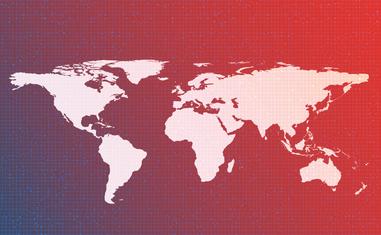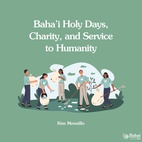The views expressed in our content reflect individual perspectives and do not represent the official views of the Baha'i Faith.
One of the major societal trends many individuals and institutions have begun to identify – the deterioration of the world’s international order – ought to give us all cause for concern.
Although it may seem invisible to many of us, the current international order has provided most of the world’s people relative freedom from war for the past 75 years. It has given us the benefits of global trade in goods, services, and technology; it has generated a rapid decrease in poverty and hunger for at least a billion people; it has dramatically reduced infant mortality and disease; and it has, for the very first time, opened many borders between nations and cultures, allowing all of us to consider ourselves world citizens.
RELATED: Peace, Our Most Precious Possession
That post-World War II international community, often called the “liberal international order,” has traditionally rested on three supporting ideas: national sovereignty, economic openness, and rule-based multilateralism.
The Baha’i teachings ask humanity to jettison one of those outworn ideas – national sovereignty – and replace it with a new vision of international unity, further strengthening the ties that connect peoples and nations.
Baha’u’llah, the prophet and founder of the Baha’i Faith, wrote in his 1873 tablets to the kings and rulers of the world:
We see you adding every year unto your expenditures and laying the burden thereof on the people whom ye rule; this verily is naught but grievous injustice. Fear the sighs and tears of this Wronged One, and burden not your peoples beyond that which they can endure …. Be reconciled among yourselves, that ye may need armaments no more save in a measure to safeguard your territories and dominions. Be united, O concourse of the sovereigns of the world, for thereby will the tempest of discord be stilled amongst you and your peoples find rest. Should any one among you take up arms against another, rise ye all against him, for this is naught but manifest justice.
This global unity, the primary goal of the Baha’i revelation, represents the maturation of the human race and the best possible road to peace, security, and prosperity for all of the world’s people.
The Guardian of the Baha’i Faith, Shoghi Effendi, interpreted Baha’u’llah’s principles of international peace in The World Order of Baha’u’llah, when he commented directly on the passage above:
What else could these weighty words signify if they did not point to the inevitable curtailment of unfettered national sovereignty as an indispensable preliminary to the formation of the future Commonwealth of all the nations of the world? Some form of a world super-state must needs be evolved, in whose favor all the nations of the world will have willingly ceded every claim to make war, certain rights to impose taxation and all rights to maintain armaments, except for purposes of maintaining internal order within their respective dominions.
Beginning at the end of World War II and erected primarily after the Cold War, the existing international order has only partially followed these Baha’i principles. Yes, it has tended to ask nations to cede some of their sovereignty and decision-making authority to international institutions in pursuit of multilateralism, but it has done so without solving the problems of competing interests, military power, and absolute national sovereignty. This has created substantial tensions over national and ethnic identity politics, and many countries have resisted solving those issues because of the old dictates of nationalism.
Now, however, we have a considered body of evidence that the international order faces serious jeopardy, not only from the global coronavirus pandemic but also from eroding civic cohesion and unity. Recently the United States National Intelligence Council, a collective body of the country’s multiple intelligence agencies, published a sobering warning in a report called Global Trends 2040 – A More Contested World. This important document cautions that the international order faces increasing fragmentation and disorder, with the pressure of “more intense and cascading global challenges” expected in the next twenty years.
The Global Trends 2040 report does not consider immediate short-term challenges, but instead undertakes a long-term, two-decade forward evaluation and strategic analysis of major trends once every four years. This new iteration raises the specter of a future world where “international trade is disrupted, groups of countries create online enclaves and civic cohesion is undermined,” as Julian Barnes reported in the New York Times on April 8, 2021.
RELATED: Reflections on the Coronavirus and the Oneness of Humanity
The previous Global Trends report, released in 2017, predicted the onset of a global pandemic during the 2020’s, proving that these reports and their conclusions cannot be ignored.
The new report recognizes and names many potentially dis-unifying societal issues, saying “Efforts to contain and manage the virus have reinforced nationalist trends globally, as some states turned inward to protect their citizens and sometimes cast blame on marginalized groups.” Those trends, the report predicts, will make global politics more volatile, more conflicted, and potentially more hostile in the years ahead.
The Global Trends 2040 report identifies several contributing factors that will increasingly come into play over the next two decades, and that will potentially destabilize the existing order:
- The spread of partisanship, polarization, and cultural divisions in many nations
- The continuing growth of income inequality
- The impacts of climate change
- Increasing climate refugee migration
- The “trust gap” separating an informed public with faith in governmental solutions from a wider public with deep skepticism of institutions
- Technology itself, especially where algorithms, outrage-driven social media, and political interference in the internet have made the public more vulnerable to misinformation.
After listing and evaluating those factors, and applying them to five different potential future scenarios, the Global Trends report 2040 reaches some startling conclusions:
“The international system – including the organizations, alliances, rules, and norms – is poorly set up to address the compounding global challenges facing populations. …
“The international system is directionless, chaotic, and volatile as international rules and institutions are largely ignored. …”
All in all, the report shows that the pandemic and several other factors have proven the weakness of the existing international order, and concludes that “in the face of these challenges, existing systems and models of governance are proving inadequate to meet the expectations of populations.”
This insight from US intelligence agencies reaffirms Baha’u’llah’s assessment, written in the mid-1800s: “The signs of impending convulsions and chaos can now be discerned, inasmuch as the prevailing order appeareth to be lamentably defective.”
In 1985, the democratically-elected global leadership body of the world’s Baha’is, the Universal House of Justice, echoed that evaluation when they wrote in The Promise of World Peace:
Flaws in the prevailing order are conspicuous in the inability of sovereign states organized as United Nations to exorcize the spectre of war, the threatened collapse of the international economic order, the spread of anarchy and terrorism, and the intense suffering which these and other afflictions are causing to increasing millions.
Since the terrible world wars of the twentieth century, humanity has managed to construct, in a fairly flawed, haphazard, and still-developing way, a semblance of an international order. However, if we want to continue benefitting from that nascent order’s potential for peace and prosperity, it now needs to further develop and mature into a truly global system of governance.
The Baha’i teachings outline a profoundly effective model for such a system, which Baha’u’llah ordained in his writings and promised to all humanity:
Soon will the present day Order be rolled up, and a new one spread out in its stead. Verily, thy Lord speaketh the truth and is the Knower of things unseen. …
The world’s equilibrium hath been upset through the vibrating influence of this Most Great, this new World Order. Mankind’s ordered life hath been revolutionized through the agency of this unique, this wondrous System, the like of which mortal eyes have never witnessed.
If you’d like to know more about “this unique, this wondrous System,” stay tuned – the next essays in this series will explore the outline of the Baha’i model for a new world order.

















Comments
Sign in or create an account
Continue with Facebookor